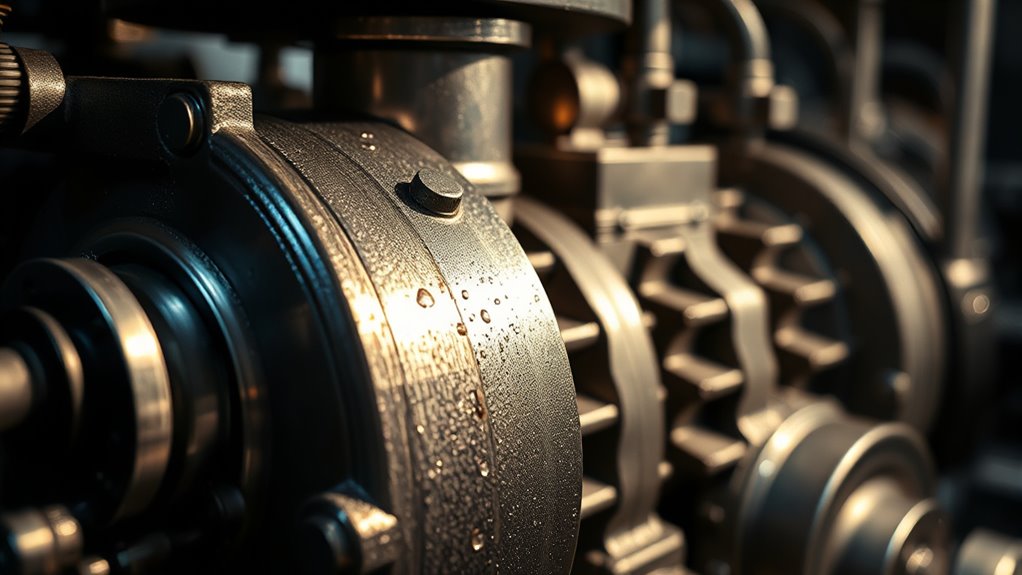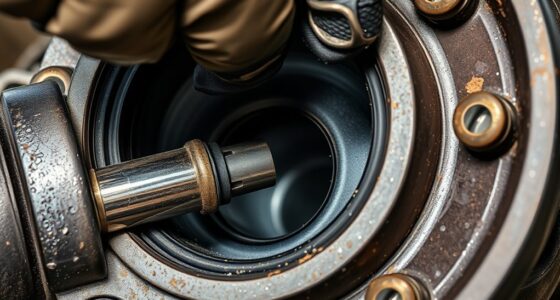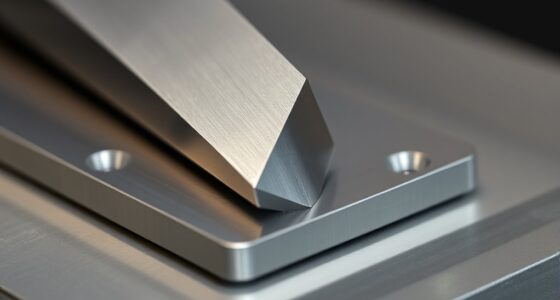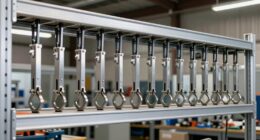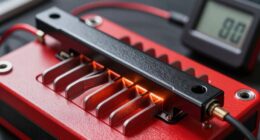A rattling noise from your hydraulic pump usually indicates internal wear, loose fittings, or contaminated fluid. First, check for loose bolts, fittings, or components and tighten them carefully. Verify the hydraulic fluid’s level and condition—replace it if it’s dirty or isn’t the correct viscosity. Regular maintenance and system checks help prevent damage and reduce noise. Keep exploring to learn how proper inspections can restore smooth pump operation and quiet performance.
Key Takeaways
- Check for loose or worn mounting bolts and fittings causing vibration and rattling sounds.
- Inspect hydraulic fluid for contamination, low levels, or incorrect viscosity that can lead to internal noise.
- Verify proper pump alignment and secure connections to prevent misalignment-induced rattling.
- Examine internal components such as seals and bearings for wear or damage, which can generate noise.
- Perform regular maintenance and system inspections to identify early signs of looseness or component wear.
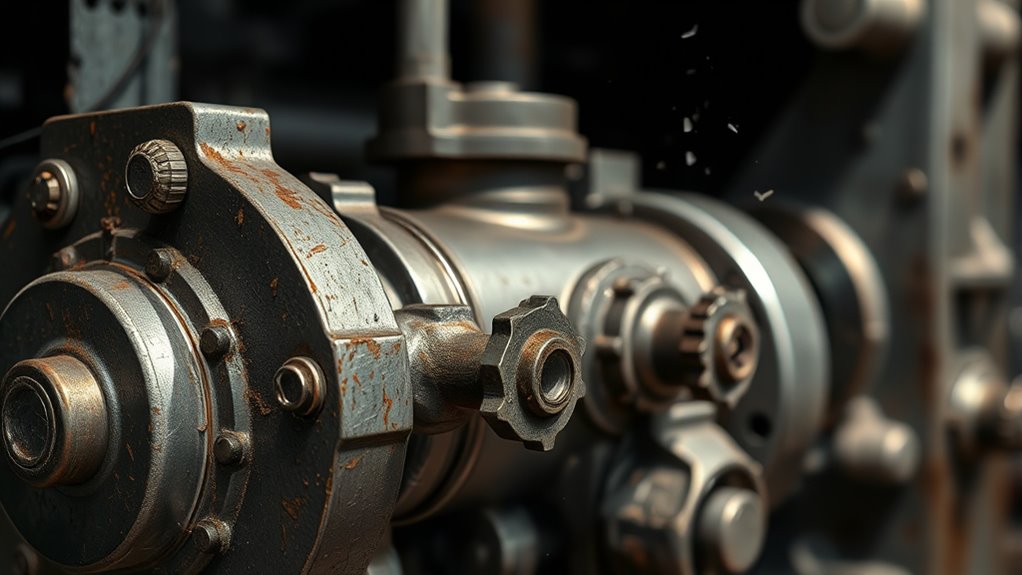
Have you ever noticed a loud, annoying noise coming from your hydraulic pump? That rattle can be a sign that something’s not quite right. When your hydraulic pump starts making noise, it’s vital to address it promptly, as ignoring the problem could lead to more severe damage or costly repairs. The first step is understanding what might be causing that rattle. Often, the issue stems from improper pump maintenance or the quality of the hydraulic fluid. If the hydraulic fluid isn’t clean or is at the wrong level, it can cause increased friction and vibrations, resulting in noise. Regularly checking and maintaining your hydraulic fluid is key to keeping your pump running smoothly.
Start by inspecting the hydraulic fluid; verify it’s at the correct level and free of contaminants. Dirty or degraded fluid can cause the pump to work harder, which increases noise and wear. Changing the hydraulic fluid at scheduled intervals is part of good pump maintenance and helps prevent noise issues. Also, confirm that the hydraulic fluid’s viscosity matches the manufacturer’s specifications. Using the wrong type of fluid or neglecting to replace it can lead to inconsistent lubrication, which contributes to rattling sounds.
Inspect and maintain hydraulic fluid regularly to prevent noise and ensure smooth pump operation.
Beyond fluid issues, pump maintenance involves inspecting the entire system for loose components. Vibrations or rattles can occur if mounting bolts are loose or if internal parts have shifted or worn out. Tighten any loose fittings or bolts, but be careful not to overtighten—this can cause damage. Check for signs of wear such as damaged seals or bearings, which can create additional noise. Worn bearings are a common culprit because they lose their smooth operation, leading to increased vibrations and rattling sounds. Replacing worn parts early can prevent more extensive damage down the line.
Another consideration is aligning the pump properly. Misalignment can cause uneven load distribution, leading to vibrations and noise. Confirm that the pump is mounted correctly and aligned with connected components. Proper alignment reduces stress on the pump and minimizes noise. If you’re unsure about how to do this, consult the manufacturer’s guidelines or a professional for assistance.
In essence, addressing a noisy hydraulic pump starts with good pump maintenance and ensuring your hydraulic fluid is clean and appropriate for your system. Regular inspections, fluid checks, and timely replacements keep your pump operating quietly and efficiently. When you catch the signs early and perform these routine checks, you’ll extend the lifespan of your equipment and avoid costly repairs. Remember, a quiet pump isn’t just more pleasant — it’s a sign that your hydraulic system is healthy and functioning as it should. Additionally, using proper maintenance procedures can significantly reduce the likelihood of future noise issues.
Frequently Asked Questions
Can a Noisy Hydraulic Pump Cause System Failure?
Yes, a noisy hydraulic pump can cause system failure if overlooked. The noise often indicates issues like low hydraulic fluid, worn bearings, or pump cavitation, which can lead to insufficient pressure and damage to components. Regular pump maintenance, including checking hydraulic fluid levels and quality, helps prevent failures. Addressing the noise early ensures your system stays efficient and prolongs the pump’s lifespan.
How Often Should Hydraulic Pumps Be Inspected for Noise?
You should inspect your hydraulic pump for noise during routine maintenance, ideally every few months or according to your equipment’s manufacturer recommendations. Regular noise monitoring helps you detect early signs of issues like rattling, which could indicate internal problems. By staying attentive and performing consistent inspections, you can prevent potential failures, extend the pump’s lifespan, and ensure smooth operation of your hydraulic system.
Are There Specific Brands Prone to Pump Noise Issues?
Some brands are more prone to pump noise issues due to their reputation for inconsistent quality or design flaws. You should consider maintenance practices, as poorly maintained pumps from any brand can develop noise problems. Renowned brands often have better quality control, but regular inspections and timely servicing are vital. Always research a brand’s reputation and follow recommended maintenance routines to minimize noise and guarantee peak hydraulic pump performance.
What Safety Precautions Should Be Taken During Pump Diagnosis?
Imagine the contrast between a quiet workshop and the loud rattle of a hydraulic pump. You should wear personal protective equipment like gloves and goggles to shield yourself from potential hazards. Always familiarize yourself with emergency shutdown procedures before starting diagnosis. These precautions help protect you from fluid leaks, high-pressure bursts, or unexpected equipment movement, ensuring you stay safe while identifying and fixing the pump’s noise issues.
Can Noise Indicate a Need for Pump Replacement?
Yes, excessive noise can signal you need a pump replacement. During pump maintenance, listen for rattling sounds that persist despite noise mitigation efforts. Continuous noise often indicates worn bearings, internal damage, or fluid issues, which reduce efficiency and could cause further damage. If cleaning and adjustments don’t diminish the noise, consider replacing the pump to avoid costly repairs and ensure smooth operation.
Conclusion
A noisy hydraulic pump can be a sign of underlying issues, but catching it early saves you time and money. Did you know that nearly 60% of hydraulic pump failures are caused by neglecting early warning signs like rattling? By diagnosing and addressing the noise promptly, you can extend your pump’s lifespan and avoid costly repairs. Stay attentive to sounds and keep your hydraulic system running smoothly for years to come.
